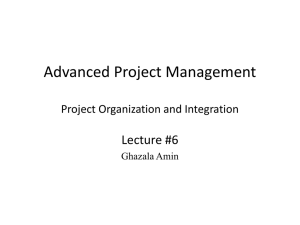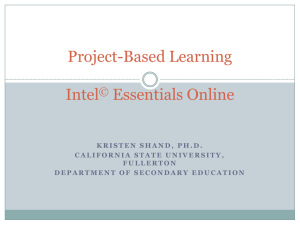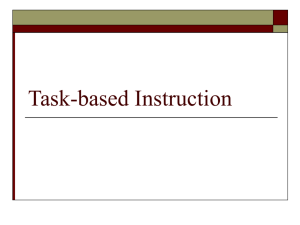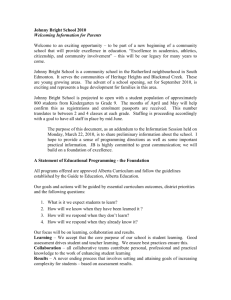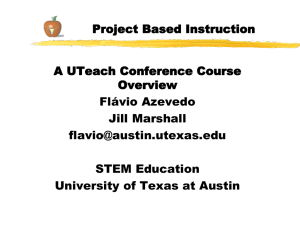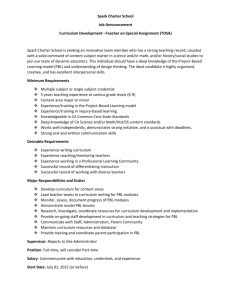Document 10375258
advertisement
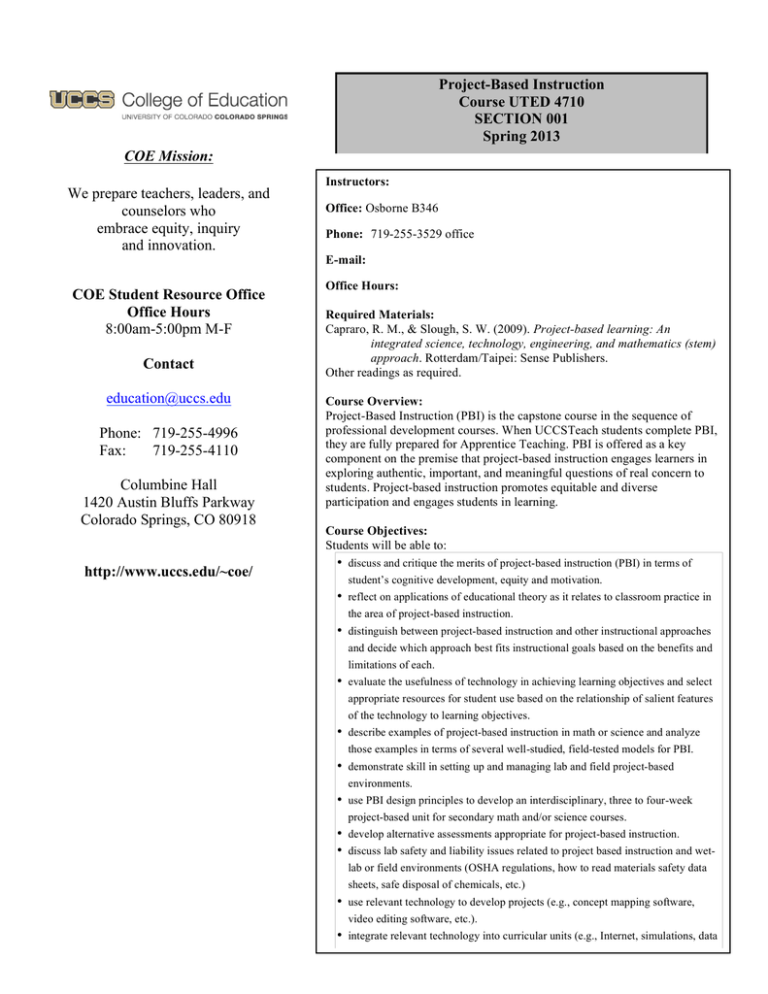
Project-Based Instruction Course UTED 4710 SECTION 001 Spring 2013 COE Mission: We prepare teachers, leaders, and counselors who embrace equity, inquiry and innovation. COE Student Resource Office Office Hours 8:00am-5:00pm M-F Contact education@uccs.edu Phone: 719-255-4996 Fax: 719-255-4110 Columbine Hall 1420 Austin Bluffs Parkway Colorado Springs, CO 80918 http://www.uccs.edu/~coe/ Instructors: Office: Osborne B346 Phone: 719-255-3529 office E-mail: Office Hours: Required Materials: Capraro, R. M., & Slough, S. W. (2009). Project-based learning: An integrated science, technology, engineering, and mathematics (stem) approach. Rotterdam/Taipei: Sense Publishers. Other readings as required. Course Overview: Project-Based Instruction (PBI) is the capstone course in the sequence of professional development courses. When UCCSTeach students complete PBI, they are fully prepared for Apprentice Teaching. PBI is offered as a key component on the premise that project-based instruction engages learners in exploring authentic, important, and meaningful questions of real concern to students. Project-based instruction promotes equitable and diverse participation and engages students in learning. Course Objectives: Students will be able to: • discuss and critique the merits of project-based instruction (PBI) in terms of student’s cognitive development, equity and motivation. • reflect on applications of educational theory as it relates to classroom practice in the area of project-based instruction. • distinguish between project-based instruction and other instructional approaches and decide which approach best fits instructional goals based on the benefits and limitations of each. • evaluate the usefulness of technology in achieving learning objectives and select appropriate resources for student use based on the relationship of salient features of the technology to learning objectives. • describe examples of project-based instruction in math or science and analyze those examples in terms of several well-studied, field-tested models for PBI. • demonstrate skill in setting up and managing lab and field project-based environments. • use PBI design principles to develop an interdisciplinary, three to four-week project-based unit for secondary math and/or science courses. • develop alternative assessments appropriate for project-based instruction. • discuss lab safety and liability issues related to project based instruction and wetlab or field environments (OSHA regulations, how to read materials safety data sheets, safe disposal of chemicals, etc.) • use relevant technology to develop projects (e.g., concept mapping software, video editing software, etc.). • integrate relevant technology into curricular units (e.g., Internet, simulations, data analysis packages, modeling software, etc.). Accreditation Standards Effective Teachers in the State of Colorado have the knowledge, skills, and commitments needed to provide excellent and equitable learning opportunities and growth for all students. They strive to support growth and development, close achievement gaps and to prepare diverse student populations for postsecondary and workforce success. Effective Teachers facilitate mastery of content and skill development, and employ and adjust evidence-based strategies and approaches for students who are not achieving mastery and students who need acceleration. They also develop in students the skills, interests and abilities necessary to be lifelong learners, as well as for democratic and civic participation. Effective Teachers communicate high expectations to students and their families and utilize diverse strategies to engage them in a mutually supportive teaching and learning environment. Because effective Teachers understand that the work of ensuring meaningful learning opportunities for all students cannot happen in isolation, they engage in collaboration, continuous reflection, on-going learning and leadership within the profession. Technology Competencies: It is expected that students begin our program with foundational technology skills that include digital word processing, digital and online formats (e.g. Blackboard) and using online research databases. Knowledge of the use of technology-supported multimedia, such as PowerPoint and other audio/video resources, is expected. Students who need assistance with building technological skills should speak with their professor to learn about technology resources in the COE and at UCCS. Using your UCCS email account is a requirement of this course due to digital delivery of course content. All students must obtain a UCCS email address and check it regularly (every day) so as not to miss announcements. If your UCCS email address is not your primary one, please have emails from UCCS rerouted to the one you check daily. Attendance, Preparation, and Participation: Students are expected to maintain high standards of ethical and professional conduct. This includes attending class, being adequately prepared, contributing to class discussions, submitting high caliber work and representing your own work fairly and honestly. As an important member of a classroom community, attendance and punctuality is mandatory. You must actively engage in class and group work to maximize your learning in this course. If you must miss a class, please inform the professor by phone or email prior to class. It is the responsibility of the student to obtain course information that is missed during the absence. Unexcused absences will result in a lower grade. Professional Behavior: Professional behavior is necessary for you to be a successful member of a learning community. Please monitor your participation in class discussions and group work and find ways to contribute intelligently to the discussion without silencing others. All written assignments must be computer generated unless otherwise indicated by the professor. Professional behavior will be expected in your future teaching/counseling career and is often the hallmark of career success. Diversity Statement: The faculty of the College of Education is committed to preparing students to recognize, appreciate, and support diversity in all forms – including ethnic, cultural, religious, gender, economic, sexual orientation and ability – while striving to provide fair and equitable treatment and consideration for all. Any student who believes that he/she has not been treated fairly or equitably for any reason should bring it to the attention of the instructor, Department Chair or the Dean of the College of Education. Accommodations: The College of Education wishes to fully include persons with disabilities in this course. In compliance with section 504 and the Americans with Disabilities Act (ADA), UCCS is committed to ensure that “no otherwise qualified individual with a disability … shall, solely by reason of disability, be excluded from participation in, be denied the benefits of, or be subjected to discrimination under any program or activity…” If you are a student with a disability and believe you will need accommodations for this class, it is your responsibility to contact and register with the Disabilities Services Office, and provide them with documentation of your disability, so they can determine what accommodations are appropriate for your situation. To avoid any delay in the receipt of accommodations, you should contact the Disability Services Office as soon as possible. Please note that accommodations are not retroactive and disability accommodations cannot be provided until a “Faculty Accommodation Letter” from the Disability Services office has been given to the professor by the student. Please contact Disability Services for more information about receiving accommodations at Main Hall room 105, 719-255-3354 or dservice@uccs.edu . Military Students: Military students who have the potential to participate in military activities including training and deployment should consult with faculty prior to registration for any course, but no later than the end of the first week of classes. At this time, the student should provide the instructor with a schedule of planned absences, preferably signed by the student's commander, in order to allow the instructor to evaluate and advise the student on the possible impact of the absences. In this course, the instructor will consider absences due to participation in verified military activities to be excused absences, on par with those due to other unavoidable circumstances such as illness. If, however, it appears that military obligations will prevent adequate attendance or performance in the course, the instructor may advise the student to register for the course at another time, when she/he is more likely to be successful. Student Appeals: Students enrolled in programs or courses in the College of Education may access the COE Appeal/Exception Form at: http://www.uccs.edu/Documents/coe/studentresources/AppealsForm2009.pdf. This form is to be used for an appeal when a student is: (1) denied admission to professional education program (2) denied permission to student teach or complete professional internship (3) removed from a professional education program or internship (4) denied permission to graduate due to missing requirements (5) requesting an exception to specific policies, procedures, or requirements (6) requesting a grade change This form is not to be used for requests to take classes out of sequence or to take a class without the proper prerequisites. Such requests should be initiated with the department chair. UCCS Student Code of Conduct: The purpose of the Student Code of Conduct is to maintain the general welfare of the university community. The university strives to make the campus community a place of study, work, and residence where people are treated, and treat one another, with respect and courtesy. http://www.uccs.edu/~oja/student-conduct/student-code-of-conduct.html UCCS Student Rights and Responsibilities: http://www.uccs.edu/orientation/student-rights-and-responsibilities.html UCCS Academic Ethics Code: http://www.uccs.edu/Documents/vcaf/200-019%20StudentAcademic%20Ethics.pdf Course Expectations: (1) Attendance/Participation – 15% of your grade is based on attendance and active participation in all class and field sessions. Credit for attendance requires arriving on time to each class and field session, participating in all activities, and staying until the session ends. If you arrive late or leave early, you will lose 2.5 points of your attendance grade. If you miss a session, you will lose 5 points of your attendance grade. Arriving more than 15 minutes late for class will constitute an absence. Attendance in class is important because you will: (a) plan and/or practice your lessons with your partner; (b) get feedback from the instructors and other members of the class regarding your lessons; and (c) observe and learn from demonstration lessons and classroom guided discussions. (2) Field Experience - You and a teaching partner will teach project-based inquiry science/mathematics lessons in a local school. Over the course of the semester, you will visit this classroom to conduct 2 observations and develop/teach 5 lessons. Early in the semester, pairs will meet their Mentor Teachers to verify the dates of the observations and topics of the lessons. You will send a draft and a revised draft lesson plan as an email attachment to your instructor at UCCS and to your Mentor Teacher at the elementary school for approval before you teach the lesson. Your Mentor Teacher will give you feedback after each lesson you teach. Your Mentor Teacher will also write a final evaluation of your field experience. If you have a serious emergency and you must miss your scheduled teaching day, notify your partner, your Mentor Teacher, and your instructor as soon as possible. Your partner will teach the lesson alone, and you will be required to make up the missed teaching day(s). Your field teaching experience is a requirement of PBI. Regardless of your final average, failure to teach all required lessons will result in a failing grade for the course. Teaching supplies are available for you to check out for use in your lessons. You are responsible for all items in your care and must return them in a timely fashion. If you need to purchase supplies for a particular lesson, you must get approval from your instructor at least 5 days prior to your lesson. Materials that have to be ordered require a two week notice. (3) Professionalism in the Field – As representatives of UCCS, UCCS Teach, and as visiting teachers to your local school, we expect you to be professional when participating in your field experiences for this course. You are expected to observe all school district rules, policies, and procedures. Sign in at the front office of the school each day that you visit. You must bring your driver’s license with you. Be sure to wear your name badge that identifies you as a UCCS Teach student. Dress professionally. Each school district has a dress code for teachers and others in field placements. As guest teachers, you are expected to follow all parts of the dress code. Of particular note is the restriction against wearing jeans, flip flops, jewelry in visible pierced areas other than the ear, t-shirts, shorts, or exercise clothing. Arrive at least 30 minutes before your scheduled teaching time; arrive 1 hour before a technology or lab-based lesson to set up and troubleshoot equipment. Practice every aspect of your lesson before you teach it. Decide exactly how you and your partner will share the teaching responsibilities. Make a plan for how you will transition from each part of the lesson to the next. Learn the names of your students! Make nametags or name tents and bring them with you to each lesson. This is an easy and effective classroom management technique. (4) Lesson Plans and Reflections – You will be submitting a total of 2 observation reflections, 1 field experience reflection, a PBI field experience lesson plan, and a final PBI unit lesson plan throughout the semester. Your two observation reflections and PBI unit lesson plan will be submitted to Blackboard. All other reflections and lesson plans will be submitted to TaskStream within one week (7 days) after each lesson that is taught or observed. *Please use the following naming conventions when submitting your lessons and reflections: Lessons: Last name 1_Last name 2_Assignment name Example: Baker_Smith_Observation 1 Reflection (5) Late Assignments – If an assignment is submitted late, points will be reduced by 10% for each day late. If more than 5 days late, you will receive a fixed 50% reduction. Course Objectives: Course Objectives and Evidence of Student Learning and Engagement Students will Evidence: Discuss and critique the merits of projectbased instruction in terms of student's cognitive development, equity and motivation. • • Reflect on applications of educational theory as it relates to classroom practice in the area of project-based instruction. • • In-class and online discussions A grant proposal to implement a project-based unit that includes a rationale and potential impact Distinguish between project-based instruction and other instructional approaches and decide which approach best fits instructional goals based on the benefits and limitations of each. • • In-class and online discussions A project-based unit that includes benchmark lessons and a lesson sequence that incorporates appropriate instructional approaches. Evaluate the usefulness of technology in achieving learning objectives and select appropriate resources for student use based on the relationship of salient features of the technology to learning objectives. • An annotated list of relevant resources and technological tools for a project-based unit Classroom presentation utilizing technology tools • • In-class and online discussions A project-based unit that includes a rationale and objectives A grant proposal to implement a project-based unit that includes a rationale and potential impact Course Objectives and Evidence of Student Learning and Engagement Students will Use inquiry methods with secondary students in a problem-based setting. Evidence: • • A project-based unit that includes benchmark lessons and a lesson sequence that incorporates appropriate instructional approaches. Videotape evidence of UCCS Teach students leading problem-based activities in a field setting Describe examples of project-based instruction in math or science and analyze those examples in terms of several wellstudied, field-tested models for PBI. • • In-class and online discussions Field observations of project-based classrooms Demonstrate skill in setting up and managing wet lab and field project-based environments. • Videotape or observational evidence of UCCS Teach students setting up and managing wet lab and field project-based environment Use PBL design principles to develop an interdisciplinary, three to four-week project-based unit for secondary math and/or science courses. • A project-based unit including an anchor video, calendar, rationale, objectives, theoretical basis for the project, concept map, benchmark lessons, investigations, alternative assessments, strategies for differentiating instruction for students with special needs, related resources and technology tools. Develop alternative assessments appropriate for project-based instruction. • Problem-based lessons that include alternative assessments A project-based unit that includes alternative assessments • Discuss lab safety and liability issues related to project based instruction and wet-lab or field environments (Occupational Safety and Health Administration (OSHA) regulations, how to read materials safety data sheets, safe disposal of chemicals, etc.) • Use relevant technology to develop projects (e.g., concept mapping software, video editing software, etc.). • • Participation in class discussion on safety and liability issues A project-based unit that includes safety precautions Technology-based or developed project elements Course Objectives and Evidence of Student Learning and Engagement Students will Evidence: Integrate relevant technology into curricular units (e.g., Internet, simulations, data analysis packages, modeling software, etc.). • A project-based unit that includes lessons that integrate the use of technology Plan instruction that promotes equitable and diverse participation so that all students have an opportunity to learn. • A project-based unit that includes lesson plans documenting modifications for special populations Assignments and Grading: Assignment Attendance, Participation, Field Trip Preparation Topic and Driving Questions Classroom Observation Reflection1 Anchor Video Article Review 1 Classroom Observation Reflection 2 PBI Field Experience Lesson Plan PBI Field Experience Lesson Reflection Article Review 2 PBI Unit Plan Grant Proposal Grant Proposal Presentation Week Date / Where to Submit Points Throughout Semester / Blackboard 150 Week 3 / Blackboard By Week 5 / Blackboard Week 7 / YouTube Week 8 / TaskStream By Week 9 / Blackboard Week 13 / TaskStream 25 25 125 50 25 200 Week 13 / TaskStream 50 Week 14 / TaskStream Week 15 / Blackboard Week 16 / TaskStream Week 16 / In Class 50 150 100 50 Total = 1000 Grading Scale A: 94-100; B+: 87-89; C+: 77-79; D+: 67-69; F: 0-59 A-: 90-93 B: 84-86; C: 74-76; D: 64-66; Week Day / Topic 1 Day 1: Course Overview: What is PBI?; Course Logistics B-: 80-83; C-: 70-73; D-: 60-63; In Class Activity / Reading • Activity • Exploding Whale- Textbook Reading (Due by following Monday) • Read: PBL Text-Chapters 1, 2, &3 Assignments (Due by midnight Sat.) Read Project Based Learning: A Bridge Just Day 2: STEM-What is it and why do we care? 2 Day 3: Factors influencing PBL implementation Day 4: 3 Ws of PBL • Activity (JSAA-PBI speaker) • Article: Preservice Teachers’ Conceptions and Enactments of PBI Day 5: The Driving Questions Day 6: Using Technology in PBL • Activity • Article: Doing With Understanding: Lessons from Research on PBI Day 7: The Anchor Video Day 8:Interdisciplinary STEM PBL • Watch and discuss anchor video examples; work with group to plan video around topic and driving questions • Article: Learning-GoalsDriven Design Model Day 9: Anatomy of Fieldtrips • Activity Day 10: Assessment in PBL • Develop pre and post assessments for your field experience Day 11: Assessment in PBL Day 12: Exceptional and Diverse Learners • Assessments and rubrics • Creation of Accommodations for field experience Day 13: PBL Classroom Management Day 14: Team Plan Week • Creation of Management plan for field experience • Finalize lesson plan and layout. 3 4 5 6 7 8 Day 15: Team Plan Week Day 16: Lesson Prep Week 9 10 11 Establishing a theme • Article: Project-Based Learning: A Bridge Just Far Enough and ProjectBase Learning: a Primer • Article: Project-Based Learning Engages Students in Meaningful Work Day 17: Lesson Prep Week Spring Break Day 18: Lesson Week • Check all fieldtrip requirements and arrangements are met • Read: PBL Text-Chapter 7 Far Enough; Respond to Blackboard discussion about article • Read: PBL Text-Chapter 6 Contact mentor teacher and discuss unit topic. • Read: PBL Text-Chapter 10 Submit topic and driving questions to Blackboard • Read: PBL Text-Chapter 8 Submit outline plan/script of anchor video to Blackboard • Read: PBL Text-Chapter 13 Read Project-Based learning to Explore Taxicab Geometry; Respond to Blackboard discussion about article; Submit Classroom Observation Reflection 1 to Blackboard. Submit pre and post assessments via email • Read: PBL Text-Chapter 11 • Read: PBL Text-Chapter 12 Post anchor video to YouTube and email link to class;Submit accommodations and management via email Submit field experience lesson plan via email; Submit Article Review 1: Project-Based Learning in PostSecondary Education to TaskStream Submit Classroom Observation Reflection 2 to Blackboard. Day 19: Lesson Week Day 20: Lesson Wrap up 12 13 Day 21: PBL Unit Plan Assignment; Final Grand Proposal Assignment and Presentation Day 22: PBI Lesson / Unit Plan Day 23: PBI Lesson / Unit Plan Day 24: PBI Lesson / Unit Plan 14 Day 25: PBI Lesson / Unit Plan Day 26: PBI Lesson / Unit Plan 15 Day 27: PBI Lesson / Unit Plan Day 28: Presentation 16 Day 29: Presentation Day 30: Presentation Make Up Day • Discussion of PBI field experience • Activities • Planning Time • Activities • Planning Time • Activities • Planning Time Submit final field experience lesson plan AND reflection to TaskStream Submit Article Review 2: Project-Based Learning for 21st Century: Skills for the Future to TaskStream Submit PBI unit plan to Blackboard; Submit grant proposal rough draft via email Submit final grant proposal to TaskStream 17 Day 31: Presentation Make Up Day References: Ada, T., & Kurtulus, A. (2012). Project-Based Learning to Explore Taxicab Geometry. Primus: Problems, Resources & Issues In Mathematics Undergraduate Studies, 22(2), 108-133. Barron, B. S., Schwartz, D. L., Vye, N. J., Moore, A., Petrosino, A., Zech, L., & Bransford, J. D. (1998). Doing with Understanding: Lessons From Research on Problem- and Project-Based Learning. Journal Of The Learning Sciences, 7(3-4), 271-311. Capraro, R. M., & Slough, S. W. (2009). Project-based learning: An integrated science, technology, engineering, and mathematics (stem) approach. Rotterdam/Taipei: Sense Publishers. Krajcik, J., McNeill, K. L., & Reiser, B. J. (2008). Learning-Goals-Driven Design Model: Developing Curriculum Materials that Align with National Standards and Incorporate Project-Based Pedagogy. Science Education, 92(1), 1-32. Lattimer, H., & Riordan, R. (2011). Project-based learning engages students in meaningful work. Middle School Journal, 43(2), 18-23. Markham, T. (2011). Project Based Learning. Teacher Librarian, 39(2), 38-42. Solomon, G. (2003). Project-Base Learning: a Primer. Technology & Learning, 23(6), 20. Standards Covered: Colorado Teacher Quality Standards Quality Standard I: Element a, d-f Quality Standard II: Element a-b Quality Standard III: Element a-h Quality Standard IV: Element b-c Quality Standard V: Element b-c National Council of Teachers of Mathematics Standards addressed in this course: 4.2, 4.3, 6.1, 7.6, 8.1, 8.2, 8.4, 8.6, 8.7, 8.9, 16.1, 16.3 National Science Teacher Association Standards addressed in this course: 1a, 1b, 3a, 3b, 4a, 4b, 5a - 5f, 6a, 6b, 7a, 7b, 8a, 9a, 9d
